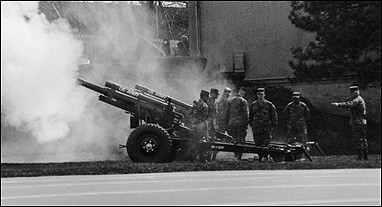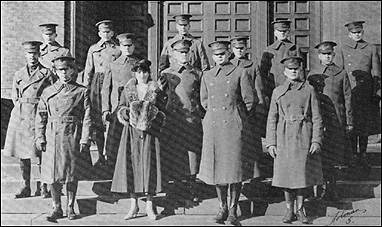![]()
Departments
![]()

|
Week of 16 April, 1999 |
Vol. II, No. 31 |
Feature
Article
Saluting ROTC on its 80th anniversary
By Eric McHenry
On August 16, 1919, the U.S. War Department authorized the establishment of a Students' Army Training Corps at Boston University. Its first two battalions belonged to the College of Business Administration, which was then located at 525 Boylston St. in the Back Bay. They conducted their marching drills on the Boston Common.
|
|
|
The First Battalion of the 101st Field Artillery unit fires an artillery salute at last year's ROTC Tri-Service Presidential Pass-in-Review on Nickerson Field. The 101st, which is the oldest field artillery unit in the country, will return on Saturday, April 17, to honor the 80th anniversary of the establishment of ROTC at Boston University. Photo by Vin Catania |
The stone monument, says Keith Tavares (CGS'88, CAS'92), assistant director of the Division of Military Education, will not be exclusively a memorial. It will honor "all ROTC alumni of Boston University who have gone on to serve in the armed forces, both during conflict and in peacetime."
Its dedication, however, gives students and alumni a special opportunity to remember those who have made the ultimate sacrifice, Tavares says. BU's ROTC graduates have served the United States in every military conflict from World War I through the present engagement in the Balkans. "And there will be alumni at the ceremony who will talk about classmates who lost their lives in war," he says, including members of the classes of '43 and '44, who were called to active duty in World War II while still undergraduates.
The monument dedication and an Army, Navy, and Air Force ROTC Alumni Reception will be followed by a luncheon, at which Lieutenant Colonel George P. Whitman (SMG'35) will be recognized as the 1999 Army ROTC Alumni Hall of Fame inductee.
Whitman says he's both honored and surprised to have been chosen, citing the many Army ROTC alumni worthy of inclusion. "In fact," he says, "the last time I talked to him, I asked Keith [Tavares], 'Would you mind telling me how the hell I was picked for this?' "
On that matter, the colonel's record of service speaks for itself. Whitman earned the Purple Heart and the Bronze Star with oak leaf cluster as a rifle company commander during the Second World War. He says his experiences in BU's ROTC program prepared him well for a military career, and that he still remembers all of his instructors by name.
|
|
|
Above: the first Army ROTC commissioning class at Boston University, from the 1920 Hub. Below: students march in last year's Presidential Pass-in-Review. Photo by Vin Catania |
|
|
One of the most meaningful ways alumni have recently shown support for military education at BU is with the declaration of a $1 million capital campaign to benefit the Charles River Battalion. In the past few years, federal scholarship money for ROTC students has diminished along with the U.S. military budget, while the cost of a college education has continued to grow. Created by the Alumni Association in partnership with the Division of Military Education, the Campaign for Leadership in the Twenty-First Century will benefit prospective cadets who are unable to secure a $16,000 annual scholarship from the government, as well as those who don't qualify for supplemental aid from the University.
"Boston University is very supportive of its ROTC programs, and consistently has been," says Tavares, "but with the scholarship cutbacks it's difficult for us to meet the tuition needs of all our students. In many cases, the Office of Financial Assistance provides the balance of tuition for scholarship recipients. With the campaign, we're raising money for those students who do not receive scholarships but want to be a part of the ROTC program, and for those students who do have scholarships but don't qualify for additional financial assistance."
A particularly generous gift from Colonel John Pershing (CAS'64), grandson of the famous World War I general, helped set a tone for the campaign. Pershing, for whom the Army ROTC headquarters at 128 Bay State Road is named, endowed in perpetuity several need-based scholarship awards for cadets who would otherwise be unable to afford a BU education. Lieutenant Colonel Richard Lally, director of the Division of Military Education, says the Pershing gift has functioned as seed money.
"I think Colonel Pershing's donation obviously spurred some others," he says. "The alumni association publicized the gift in its newsletter, and that helped generate more interest."
Boston University is one of only a few colleges and universities nationwide to house ROTC programs representing all branches of the military -- Army, Navy, and Air Force (the Marine Corps is affiliated with the Navy).
An ROTC education is noted for its rigor, Lally says. In addition to a full academic course load, cadets have two hours weekly of ROTC course work in topics ranging from army history to military justice and ethics. "Besides the two hours of weekly classroom instruction," he says, "they also receive two hours of hands-on training -- what we call our leadership lab."
Additionally, students undergo an hour of physical training, beginning at 6 a.m., either two or three times a week depending upon their year in school. And once per semester there's a weekend dedicated to field training exercises.
"We try not to do too many of those," says Lally, "because we don't want to overload the cadets, especially the freshmen and sophomores, and affect their academics. For us, academics are still the number-one priority."
|
Saturday, April 17, 1999 |
|


